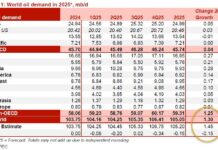Polish Deputy Minister of Agriculture Michal Kolodziejczak unofficially proposed leasing land and ports from Ukraine in early April, which was analyzed here, with the conclusion being that Ukraine is more likely to agree to the maritime dimension of his proposal than the mainland one, if any at all. Shortly afterwards, Prime Minister Donald Tusk explicitly declared that Poland plans to profit from its cooperation with Ukraine instead of continuing to support it pro bono, which was analyzed here.
These developments preceded Poland launching a state program in late April for preferential loans to Polish businesses that participate in Ukraine’s reconstruction. €58.2 million in total has been allotted, with each company allowed a maximum of €2.3 million at an interest rate of 2% to be repaid after 12 years. Less than a week later, Polish Chairman of the Foreign Affairs Committee and Chairman of the Council of Cooperation with Ukraine Pawel Kowal had an important meeting with Ukrainian officials.
One of the topics included joint maritime projects, with Deputy Minister for Communities and Territories Development Andrey Kashuba declaring that “We invite Polish partners to participate in areas such as shipbuilding, fleet modernization, port development, maritime logistics, and demining.” To review, Kolodziejczak’s informal proposal set the stage for Tusk’s open plans to profit from Ukraine, which in turn led to the preferential loan program and then Ukraine’s interest in joint maritime projects with Poland.
This last outcome was unexpected since Poland has comparatively less experience in that industry than East Asian or Western European countries, plus the economic partnership agreement that the US just clinched with Ukraine might informally give the US the “right of first offer” on all investments. The first factor suggests that Ukraine is willing to sacrifice quality for political reasons related to improving troubled ties with Poland while the second would hint at tacit American approval in that event.
Most Ukrainians interpret their centuries of shared history with Poland as a junior partnership that they’ve struggled to rebalance, at times in cooperation with the Tsardom of Russia and even the Nazis, the policy of which continues to this day as evidenced by its close ties with Germany. Observers therefore had reason to expect that Ukraine would keep Poland out of such a strategic industry, especially given its comparatively less experience, and instead work closer with others.
The curveball that Ukraine just threw might be due to the economic partnership agreement that it just clinched with the US in that Trump might be more willing to tacitly approve Poland’s role in rebuilding Ukraine’s maritime sector than Germany’s as a reward for its high military spending. To be sure, no such informal US rights might exist in practice, but this explanation is the most cogent for now given publicly available information since it compellingly accounts for Ukraine’s unexpected offer to Poland.
Poland’s new state program for preferential loans could fund some of these efforts if this pans out. Even partial Polish control over Ukrainian ports would enable Warsaw to rebalance its lopsided ties with Kiev and comprehensively stimulate cooperation in other sectors. Left uninterrupted and taken to its natural conclusion, this could result in the restoration of Polish influence in Ukraine, much to the consternation of Ukraine’s ultra-nationalist minority with possibly unpredictable consequences for their future ties.






















